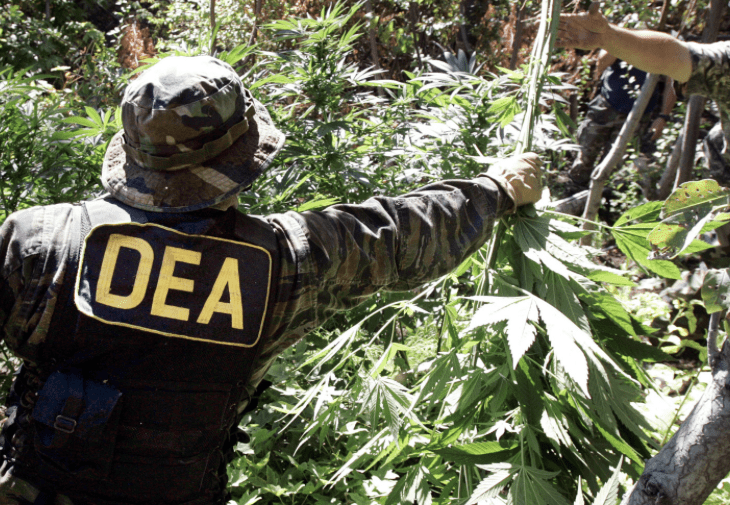
By: Bruce R. Grabowski
The latest request to lessen restrictions on the use of marijuana has been denied by the Drug Enforcement Administration (DEA). Citing a lack of evidence supporting its medical efficacy, and the strong risk of abuse, the marijuana plant, as distinct from its synthetic derivatives, will remain a Schedule I controlled substance.
Schedule I is the most restrictive category for drugs, where you will find heroin, LSD, and other highly dangerous drugs. Even a drug like cocaine is considered less dangerous, as it has been categorized as a Schedule II drug. An interesting note, tetrahydrocannabinol (THC) is the synthetic form of the naturally occurring chemical in the plant and is classified as a Schedule III drug along with codeine. Is the DEA suggesting by this decision that marijuana is as dangerous as heroin? If so, where is their scientific evidence? They are silent on this point. And their silence is causing us grave harm.
First, this federal restriction places great barriers to researchers desperate for new medicines in the fight against serious and difficult to treat medical conditions. Also, physicians are not allowed to prescribe it in cases where studies have clearly shown its medical efficacy. Yet, drugs like Ritalin and Vicodin, all Schedule II drugs, can be readily administered be physicians. To say that marijuana is more dangerous than these Schedule II drugs borders on the incredulous. Yet, by their refusal to move marijuana to a Schedule II status, they make this ridiculous claim. If physicians can readily prescribe Vicodin, why not marijuana which has shown to be far less dangerous? Again, the DEA has no credible answer.
Second, in a country where four states have allowed for “recreational” use of marijuana, and twenty-five states allow for the use of medical marijuana, the federal government’s refusal to follow the lead already established causes unfair conditions for businesses in the emerging cannabis industry. Lenders are reluctant to loan money in a climate of confusion and uncertainty. These businesses also lose out on federal tax benefits. Because of marijuana’s Schedule I status, businesses in the cannabis industry suffer under the tax provision known as 280E. This effectively denies them the ability to deduct legitimate business expenses allowed to most other industries. Though it hasn’t yet, the federal could at any time exercise its authority against businesses operating under state laws. In an election year, with all the talk on the economy and job growth, this multi-billion dollar industry is being harmed by the federal’s refusal to face the scientific evidence and majority opinion.
The core issue in this public debate is whether or not marijuana has medicinal benefits, and what harm, if any, is posed by the use of this drug. According to the DEA, the biggest reason cited for maintaining marijuana’s status is the lack of scientific studies to support its medicinal claims. The FDA requires large scale clinical trials with human subjects to determine the safety and efficacy of the product. While large scale peer-reviewed studies have been done on the various isolated chemicals found in the plant (primarily CBD and THC), DEA claims studies meeting the requirements of the FDA on the plant itself have been lacking. This claim of a lack of research is a Catch 22. The Federal restrictions placed on research make it difficult to fund or conduct the very research that the federal cites as inadequate.
However, there is a growing body of scientific, peer-reviewed studies showing strong evidence that marijuana is safe and effective. A 2014 survey of 1,500 physicians found that 56% supported the legalizing of medical marijuana. And of oncologists responding to the survey, 82% were in favor. For the DEA to claim that marijuana doesn’t offer any medical benefit, requires a complete denial of the extensive data produced by dozens of countries, as well as states like California. The DEA can claim that the world is flat for only so long, as its embarrassing position is rapidly becoming untenable.
Do we wait another two years for yet another ruling by the DEA restricting marijuana to the Schedule I category? No. We have a simpler and more direct resolution to this conflict: we compel Congress to amend the existing Controlled Substance Act, and allow for marijuana to be categorized differently. With growing pressure from scientists and doctors, state lawmakers, and many staunch political proponents (Senator Bernie Sanders (Vt.) has a bill calling for the removal of marijuana from the Controlled Substance Act), we are already nearing this endgame. Congress can remove the DEA from the debate, and make room for sanity to return. If we keep pressuring our representatives, we can finally bring some common sense and consistency back to the federal government. And much needed medical relief to millions of suffering Americans.
What are your thoughts? Please share, like, and comment on this article!
This article (An Argument For Marijuana: Why Its Time Has Come) is free and open source. You have permission to republish this article under a Creative Commons license with attribution to the author and TrueActivist.com


